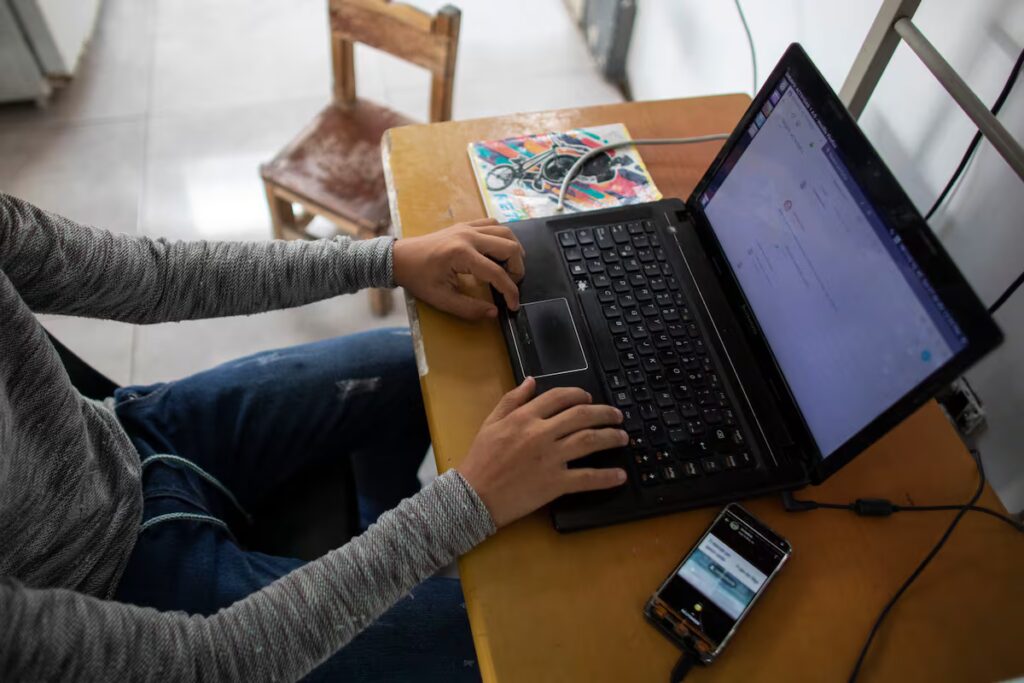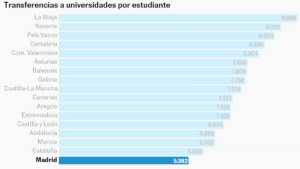
A systems engineer started working in June from Venezuela for the Spanish company Clinmedia, based in Tenerife. The engineer’s job was to check that the websites created for the digital kit, the huge state subsidy to digitize hundreds of thousands of autonomous businesses, worked well. His monthly salary was 347 euros and he created on average 20 websites a day, 140 a week. “It’s 61 cents per website, and each website took me about 30 minutes tops,” he says now. He is one of those affected by the non-payment of these works, who asked EL PAÍS to hide his name because he still hopes to collect what he is owed. “They used to pay us in dollars twice a month for Binance (a cryptocurrency management application), but they stopped doing that in September.”
In the audio and WhatsApp messages that EL PAÍS was able to see, the managers of Clinmedia state that they will only be able to cover their debts “when the Government pays us”. Clinmedia’s apparent objective was to create many web pages at ridiculous prices and maintain the difference in aid: the digital kit provided aid of 2,000 euros. A company manager did not want to answer questions from this newspaper because he would not be freed from his workload “for a few weeks”.
A group of freelancers affected by the Clinmedia deal are studying their options after meeting on Facebook and then in a WhatsApp group. Sheila Quintana, a photographer, had two new websites created that she didn’t want. She already had her own website and asked that with the subsidy they rank her better on Google, give her the billing program and an iPhone. None of this happened: “When I gave them the powers to manage the kit, they signed the contract for me, made me two identical pages with a template with false information made with AI in 10 minutes, photographs not mine, all to prove that they had performed the service”, explains Quintana. The company’s advertising promised an iPhone, which no one contacted by Quintana received. In reality, the Apple cell phone will never arrive, because the subsidy only covers desktop and laptop computers. “It was all very nice until I found out it was a lie and now they don’t get the burofaxes anymore because the address is wrong,” he adds. She assures that the organization that organized the kit, Red.es (which depends on the Ministry for Digital Transformation), only told her to give up if she does not agree, but that they will demand the bonus money.
From this public body they explain to EL PAÍS that they have identified a handful of companies that have tried to take advantage of the conditions of the digital kit. Some cases are already in the hands of the European Public Prosecutor’s Office, because they concern European funds. The temporary measure adopted by Red.es is to suspend the payment of the subsidiaries until their work is verified. The organization insists that beneficiaries’ complaints be investigated to the last consequences.
The Venezuelan systems engineer believes that there were around 50 Venezuelans paid by Clinmedia. The company ran a WhatsApp community with groups like “clinmedia seo team”, “rrss group (social network)”, “technical team”. In his case he saw the offer on a job site called Computrabajo, a Venezuelan girl interviewed him and he started working without a contract, with a verbal agreement. Their job was to check that the website worked and had the government logos below. “Basically the page was organized visually and the government benefits publication appeared in the footer,” he says. I then had to take screenshots to justify the subsidy. “Maybe in Spain that money doesn’t seem like anything, but here it helps us cover a lot of expenses,” he complains, adding that he couldn’t complain to the Red.es channel because he didn’t know it. “Since I come from Venezuela, I have complete ignorance of how everything works there,” he says.
In a WhatsApp audio message for Clinmedia employees, one of the company’s managers warns some sellers not to notify their customers. Some sellers, in good faith, had warned not to trust and to “turn to another company” to continue with the digital kit. “The issue of payments remains the same, we are still waiting and the people who stay will be rewarded,” says this manager. Venezuelans were promised bonuses of 50-70 dollars that never arrived. The engineer believes that the developers who created the websites with the famous WordPress system paid the same thing, but did not know each other. All their work was done remotely, with a dashboard where they viewed websites based on what stage of the process they were at.
For a few years, Venezuela has become one of the countries that carries out the most digital, remote and very low-cost work. From solving captchas to helping artificial intelligence tools better understand the world, thousands of Venezuelans survive on remote tasks for which they charge pennies. The 347 euros per month paid by Clinmedia was a reasonable salary by those standards.
EL PAÍS contacted other random recipients of the digital kit via Clinmedia who did not report it nor are they on any of the affected pages. Even if they don’t seem happy either. “I have a website, but what they did I could have done too,” says Joan Cantanejo. “I wanted the device, an iPhone 16, which is actually the help. A lot of documents and information in the end for nothing,” he explains.
José Manuel Bedmar was one of the last to enter after seeing the advert on Facebook, but he continues to wait, even though he has his suspicions: “I did it for a while without thinking much about it, I had already heard things, then they don’t give you anything, they don’t call you, they start asking you questions, but I continue to wait”. He already has a website very similar to Cantanejo’s, but not his iPhone.





